Table of Contents
UGC platforms, or user-generated content platforms, can revolutionise how businesses collect, curate, and strategically leverage social content for success. As UGC creators and influencers become the ultimate expression of authenticity, brands need to find a way to better connect with them and leverage all the benefits of collaborating with true voices.
Read on as we unveil the definitive top 15 UGC platforms for brands looking to automate most of the UGC collection, moderation and distribution tasks and a marketplace to connect with UGC creators and influencers in a secure environment.
From what to look for in a platform to a detailed exploration of their advantages and a comprehensive review of the top 15 contenders, this guide equips you with the knowledge to choose the right platform that can elevate your brand’s authenticity, trust, and conversions with user-generated content from customers, influencers and UGC creators.
User-generated content platforms are designed to help businesses collect, moderate, and leverage across channels content generated by their customers, fans, or community members, rather than the brand itself, for marketing and eCommerce purposes. UGC platforms also serve as a space to discover and manage UGC creators and influencers for branded campaigns.
These platforms allow companies and organisations to automate UGC tasks, including collection, moderation and distribution of reviews, photos, videos, social media posts and stories, testimonials, or other media generated by users about a brand, product, or service. They can also include influencer and UGC creator discovery and management tools.
There are two different types of UGC platforms, depending on their main focus. Although there is an overlap in their features and tools, there are UGC platforms focused on:
However, leading platforms will offer solutions focused on both needs since they complement each other perfectly. Not all UGC platforms are built equally.
UGC Platforms are tools designed to help brands aggregate, organise, and repurpose content created by any user; while user-generated content creator platforms serve as talent marketplaces where brands proactively source influencers, creators, or freelancers to produce custom content for their campaigns. However, you can find all-in-one solutions that offer both services, since they are complementary.
Authenticity drives consumer trust, and UGC platforms have become indispensable for brands aiming to harness real customer voices. The top platforms prioritise seamless integration with marketing workflows and cross-channel repurposing that empowers brands to turn organic engagement into scalable campaigns in a cost-effective way.
Let’s explore in detail the best UGC platforms for brands, their strengths and benefits.
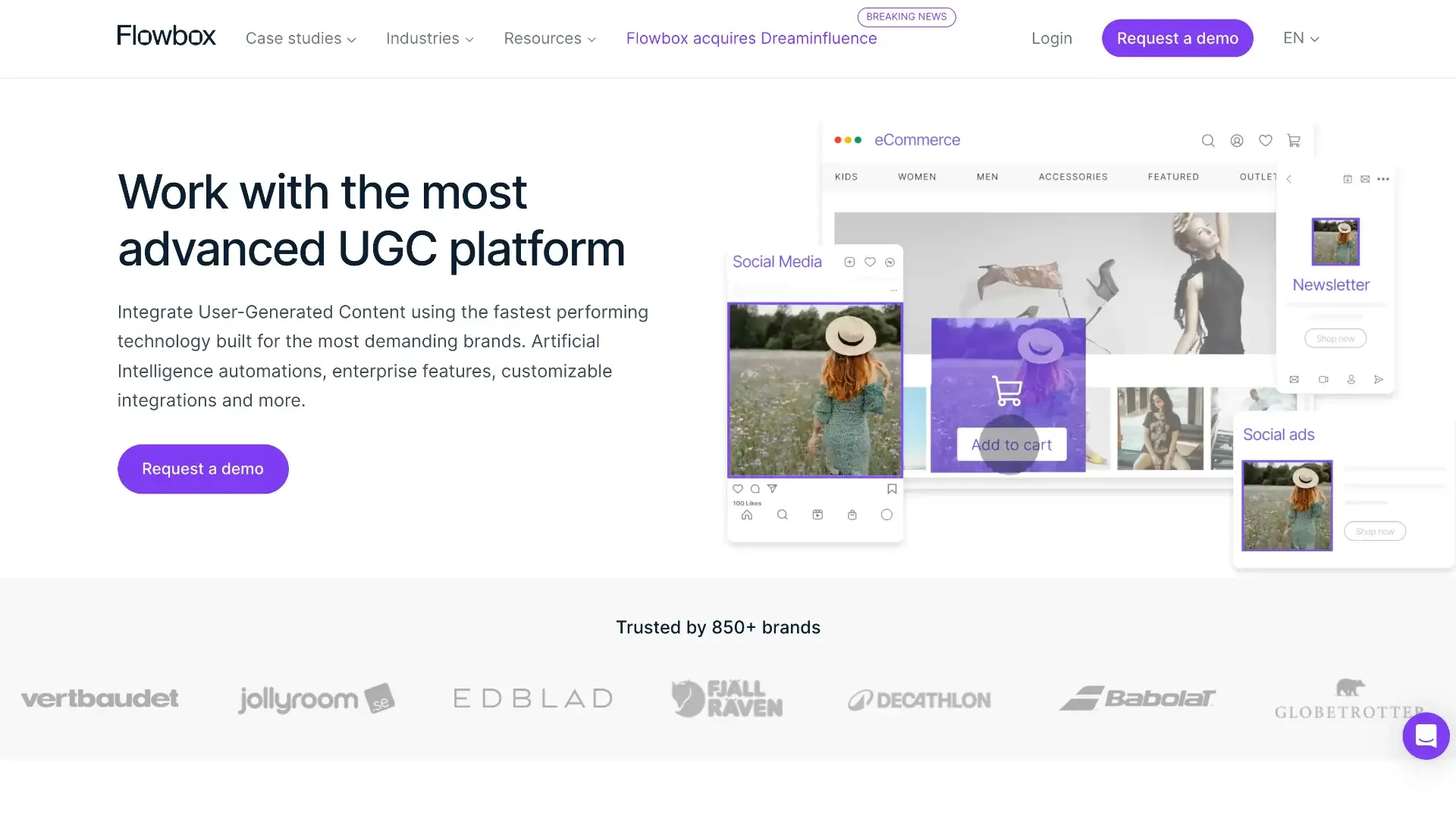
Flowbox is Europe’s leading UGC platform. It offers content management tools designed to help brands collect, moderate and distribute social content throughout the customer journey, thereby improving brand engagement, social proof and ROI.
The company has recently acquired the influencer marketplace Dreaminfluence, further cementing Flowbox’s position as a leading UGC platform, with an expanded offering to serve the ever-growing UGC market. With the latest acquisition, Flowbox provides the tools to manage all UGC, from customers and community to collaborations with UGC creators and influencers.
Flowbox’s strength lies in quick and effective integrations that blend in seamlessly on your website, regardless of what eCommerce solution you use. If you’re looking for a solution that can be adapted to the specific needs of your business, Flowbox is the perfect fit.
✅ Flowbox is perfect for medium and big brands looking to grow their community and scale their content strategy with a cost-effective platform and high ROI. Their influencers hub is a powerful opportunity for brands to match with suitable influencers and UGC creators.
❌ Flowbox is not a fit for small brands with reduced budgets looking to start a community or with minimal website traffic.
The Flowbox platform boasts a wide range of tools and capabilities, including content collection, advanced analytics, AI product recognition, robust rights request management tools for requesting user-generated content permissions, and pre-approval moderation, as well as time-saving automation, making it one of the most advanced UGC platforms on the market.
Some of Flowbox’s most relevant features are:
Flowbox integrates easily with leading eCommerce platforms, including Shopify, Magento, WooCommerce, Prestashop and Shopware. Brands can also integrate their technology using simple JavaScript code, native modules, or APIs.
Flowbox also connects with brands’ wider tech stack, including email marketing platforms, loyalty and review systems, and analytics tools.
Flowbox caters to many industries, whether they have eCommerce sites or not, including:
Whilst the Flowbox client base boasts a long list of eCommerce powerhouses, they also work with educational institutions, brick-and-mortar-only retailers, museums, travel destinations and more non-eCommerce brands.
Flowbox price is fully customisable. The price of the Core Package is calculated based on the brand’s number of website visitors and domains to integrate. The add-ons’ prices are added to the Core Package upon request.
Request a demo to learn more about the Flowbox platform, pricing and how it could adapt to the needs of your business or organisation.
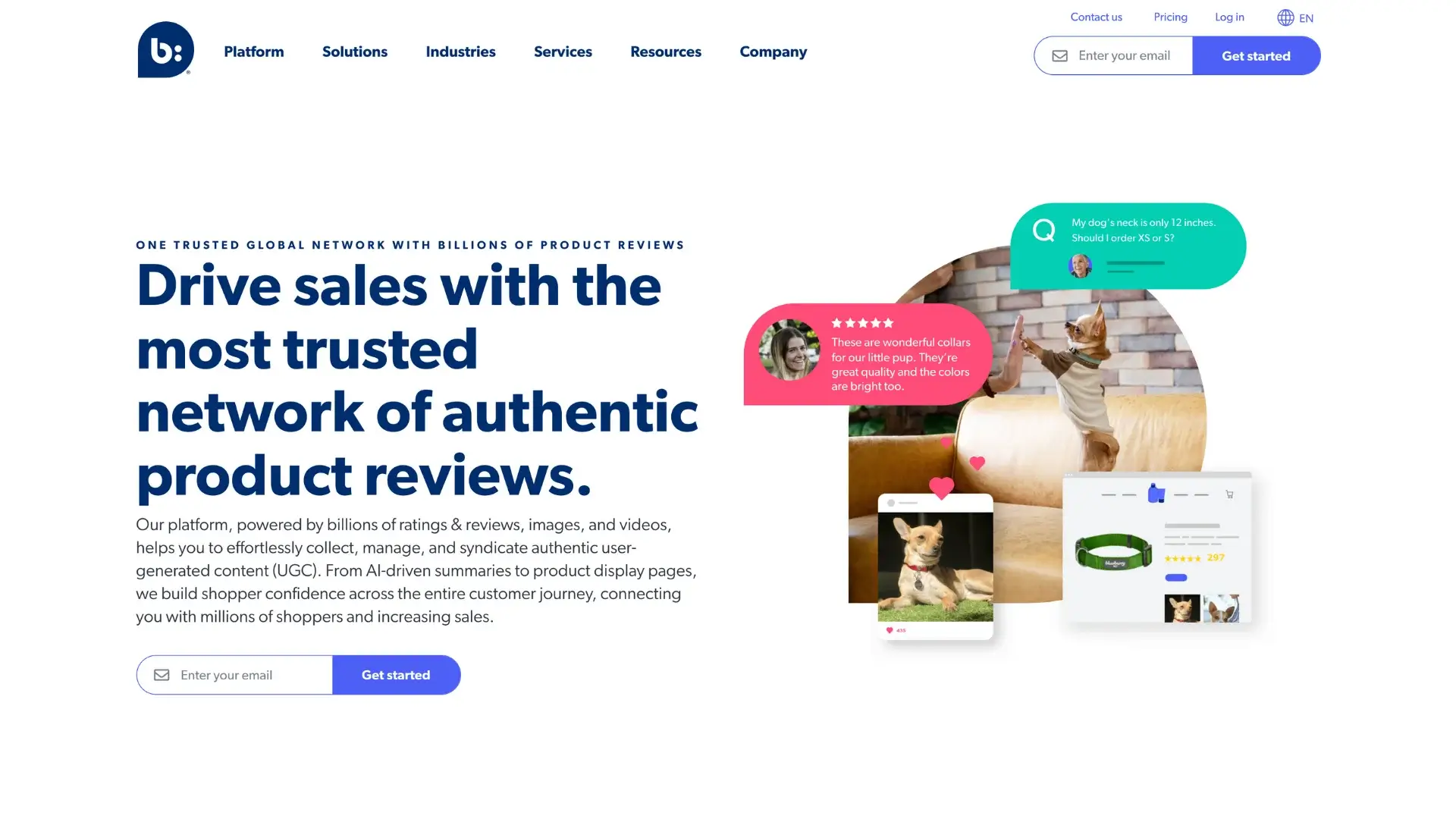
Bazaarvoice is a user-generated content platform that empowers brands and retailers to harness the power of consumer-generated content to drive engagement, build trust, and enhance the overall online shopping experience through its ability to collect, analyse, and amplify UGC, including reviews, ratings, photos, and videos
Brands and retailers can seamlessly integrate Bazaarvoice into their PDP to showcase authentic customer experiences. Bazaarvoice Vibe is an all-in-one integrated solution that can transform your content strategy and campaign implementation. They acquired Influenster, a sampling and product discovery app, in 2019 to enhance their UGC solutions.
✅ Bazaarvoice is ideal for enterprise-level or fast-scaling brands in consumer goods and retail sectors, especially those that want to drive sales via reviews, visual content, sampling, and syndication across marketplaces.
❌ Bazaarvoice is less suitable for smaller brands, low-volume businesses, cost-sensitive companies, or those outside consumer retail, due to high costs, less flexible contracts, and technical complexities.
They integrate with WooCommerce, Magento, and Shopify, among other leading platforms.
Apparel & Accessories, Consumer Electronics, Consumer Packaged Goods, Food & Beverage, Health & Beauty, and Home Improvement.
Bazaarvoice requests information from brands looking to learn more about the platform and its pricing. They then get in touch with brands directly. They have multiple packages to suit different businesses.
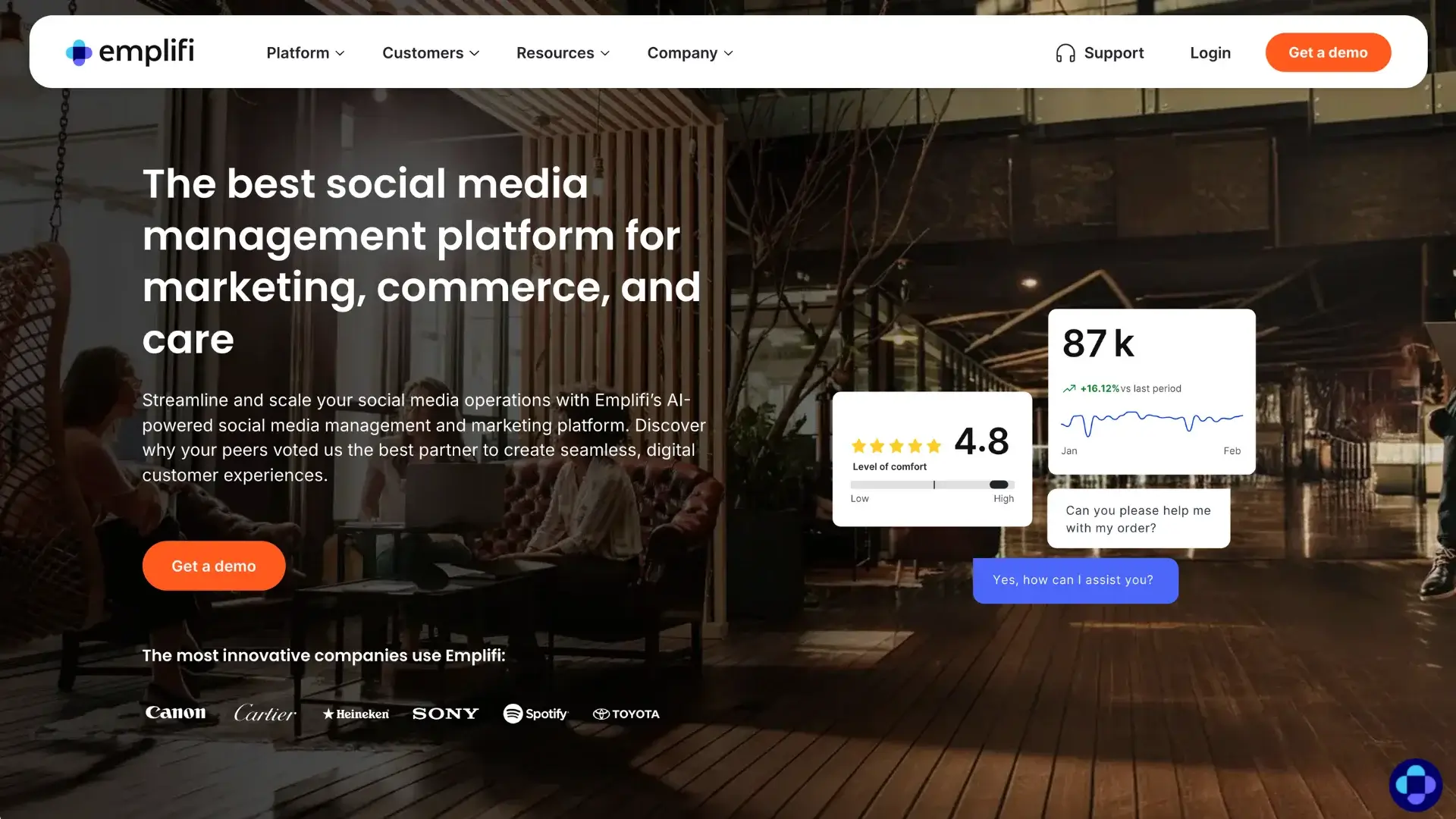
Emplifi (Pixlee TurnTo) is a user-generated content platform that offers AI-powered social media management and marketing. They specialise in community-driven commerce, offering a platform for social UGC and influencer marketing, as well as Ratings & Reviews.
They pride themselves on being a unified platform that simplifies the marketing, commerce and care through social media channels. Emplifi is a strong option for brands that rely heavily on social media for their marketing efforts.
✅ Emplifi is suitable for agencies, direct-to-consumer retailers, and consumer brands looking for a social media platform to manage their marketing, commerce and care.
❌ Emplifi is less suitable for traditional industries or companies with limited digital strategy needs and low reliance on social, engagement, or CX.
An array of platforms, including Shopify, BigCommerce, Salesforce Commerce Cloud, Magento, and Magento 2.
Agencies, Consumer Packaged Goods, Higher Education, Media & Entertainment, Restaurants, Retail & eCommerce, Sports, and Travel & Hospitality.
They don’t offer ready-made plans or pricing structures on their website. Those looking for pricing would need to book a demo of the platform to discuss it with their team.
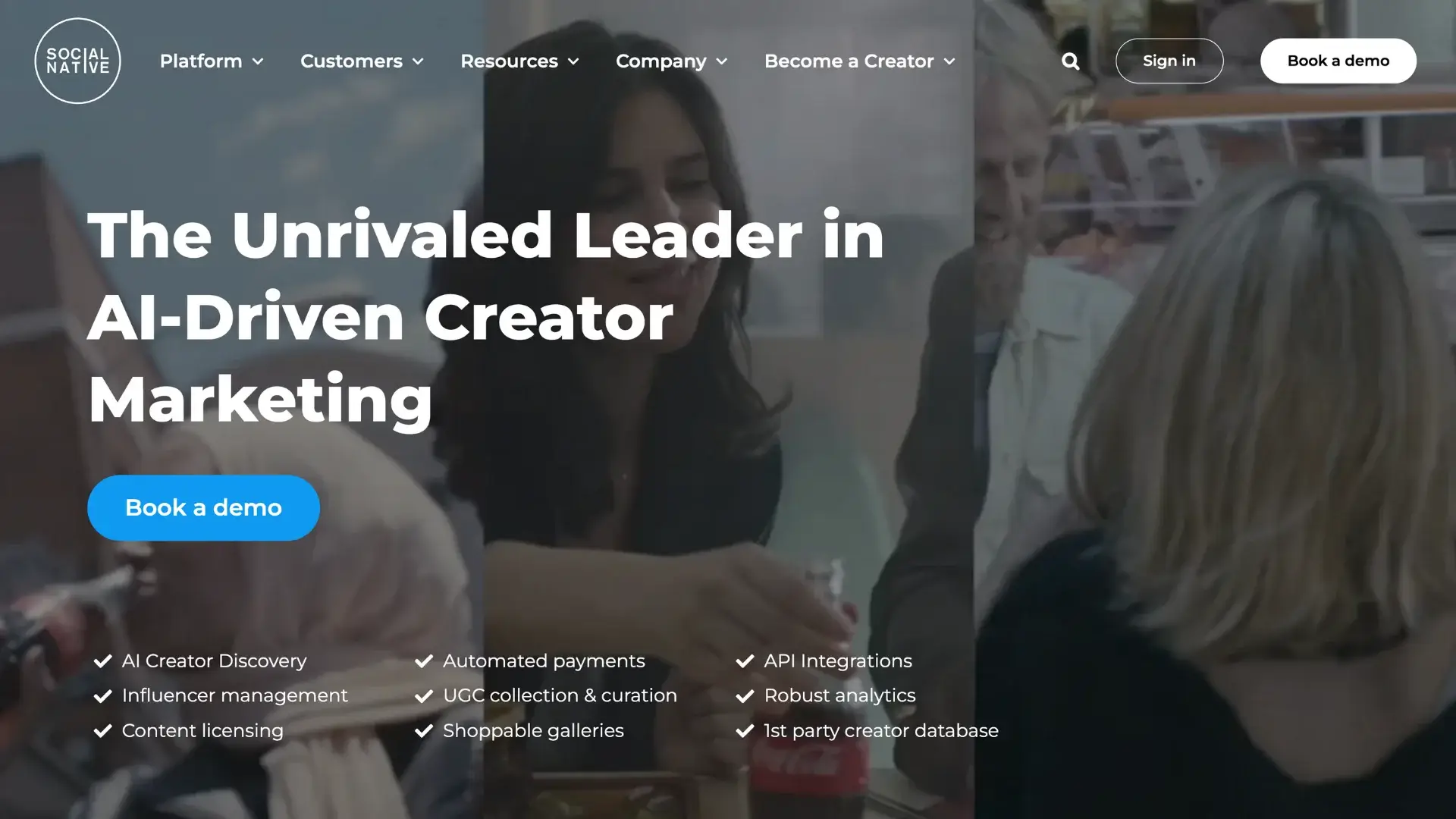
Social Native (Olapic) is a UGC platform that offers AI-driven creator marketing tools to connect brands to new and existing influencers and creators. They empower brands to leverage UGC and influencer content across paid ads, ecommerce, in-store signage, social, email, and more.
Social Native is a promising option for those looking for a platform with a focus on content and creator discovery, influencer management, and UGC curation. The platform also offers some level of artificial intelligence-backed technology, allowing users to use AI to transform still UGC images into videos.
✅ Social Native is suitable for brands running lots of campaigns needing fresh creative and looking to automate UGC and influencer content, from discovery and rights to curation and multi-channel activation. It’s especially valuable for brands looking to scale content efficiently while maintaining quality and compliance.
❌ Social Native is less suitable for low-volume brands or those seeking simpler, less costly UGC tools.
Social Native has a pretty broad compatibility with most popular eCommerce solutions; however, they don’t disclose which specific eCommerce solutions they are compatible with.
CPG, Fashion, Beauty, Food & Beverage, Travel & Hospitality, and Tech & Gaming.
Social Native doesn’t have an open pricing structure; those interested in learning more about their platform are required to book a demo.
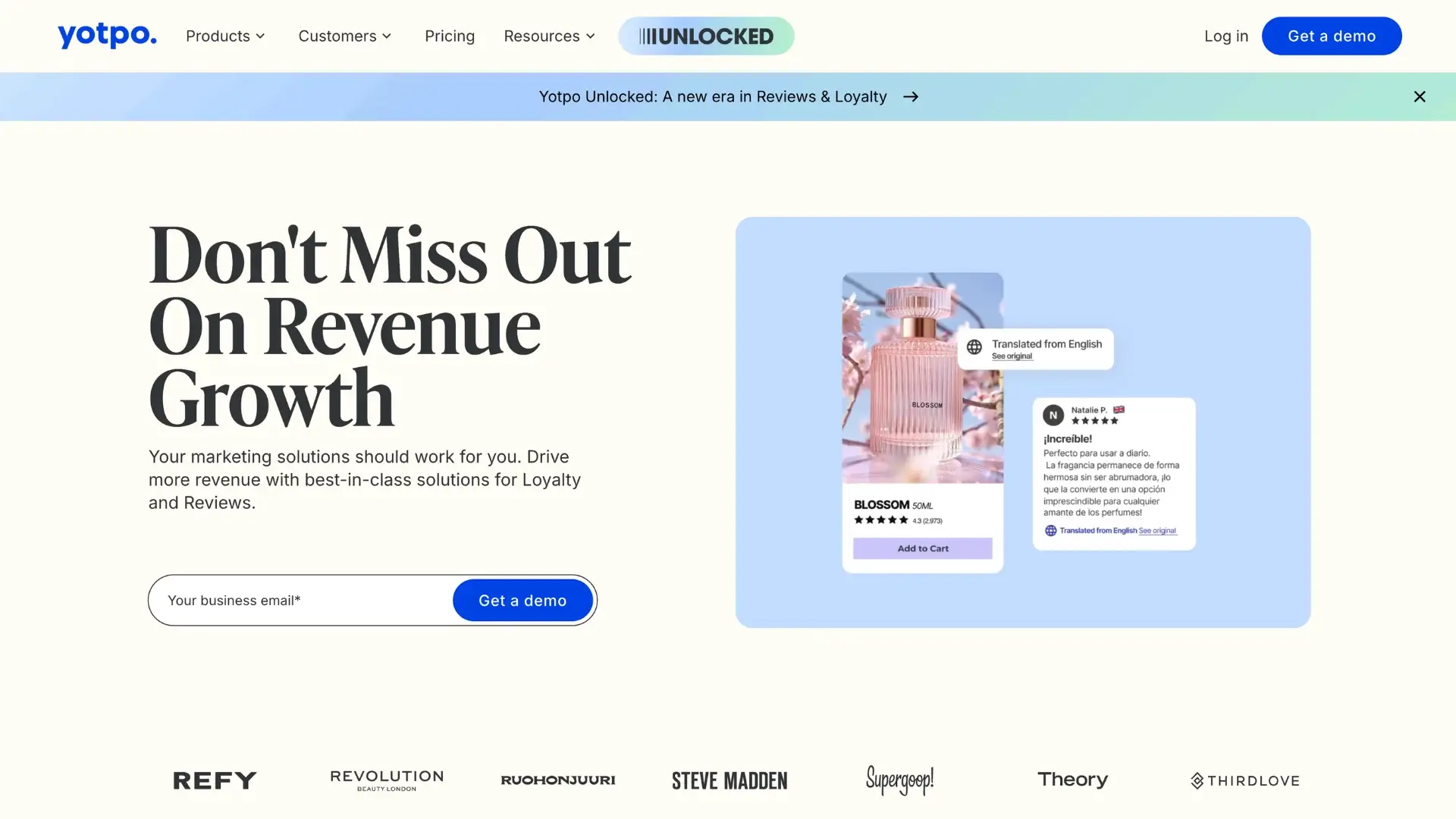
Yotpo is an eCommerce marketing and UGC platform that helps businesses collect and utilise reviews and reward repeat purchases through loyalty programs. Yotpo Reviews helps collect, manage, and display customer feedback, while Yotpo Loyalty allows brands to incentivise and reward customer behavior with points, tiers, and referrals.
✅ Yotpo is best for scaling DTC eCommerce brands that want to manage reviews, loyalty, and retention marketing in one place.
❌ Yotpo is less suitable for companies that just need a basic, affordable review app, or are highly sensitive to site speed or SEO performance.
Yotpo supports Shopify, Shopify Plus, BigCommerce, Adobe Commerce (Magento), WooCommerce, Salesforce Commerce Cloud, and custom-built or headless eCommerce setups via API integrations.
All industries, but they predominantly focused on eCommerce.
Yotpo has a multi-tiered pricing structure. For the paid version of the Reviews & UGC, there are different ready-made plans based on your monthly order volume.
For a brand with up to 500 orders a month, the Starter plan is $79/month, the Pro is $169/month, and the Premium is custom. As your order volume increases, the price increases, so it depends on the products and the scale of your business.
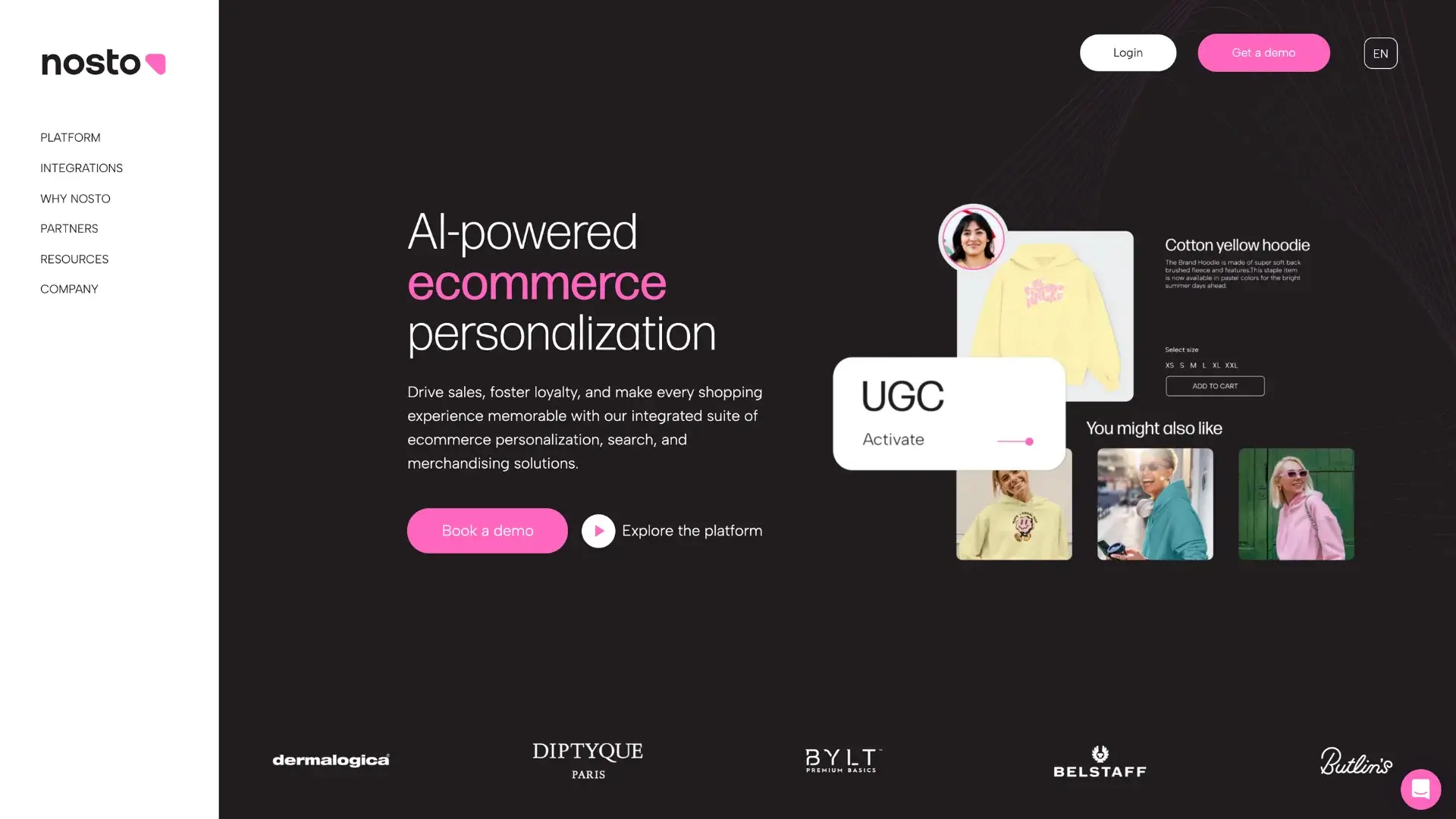
Nosto (which has acquired visual content platform Stackla) is an AI-powered Commerce Experience Platform (CXP), built to personalise and elevate every part of an online shopping journey.
Central to this is their engine, experience.AI™, which unifies customer, product, and content data in real time to power personalisation, search, merchandising, and user-generated content tools. This platform can be a strong option for bigger eCommerce brands.
✅ Nosto is best for growing and enterprise-level eCommerce brands looking to deliver AI-driven personalised shopping experiences across touchpoints, boosting conversions, order value, and omnichannel performance.
❌ Nosto is less suitable for small eCommerce operations with no need for advanced personalisation, only looking for UGC.
They have two main suites, one of them being the Content Experience Cloud (closer to the UGC topic), built for enhancing on-site engagement with:
They claim to be able to pull from any social media network.
Nosto is known for supporting various eCommerce solutions, including popular platforms like Shopify, Magento, BigCommerce, Salesforce Commerce Cloud, and others.
Retail, Apparel & Fashion
Nosto doesn’t have an open pricing structure. Those interested in learning more about their platform are required to book a demo.
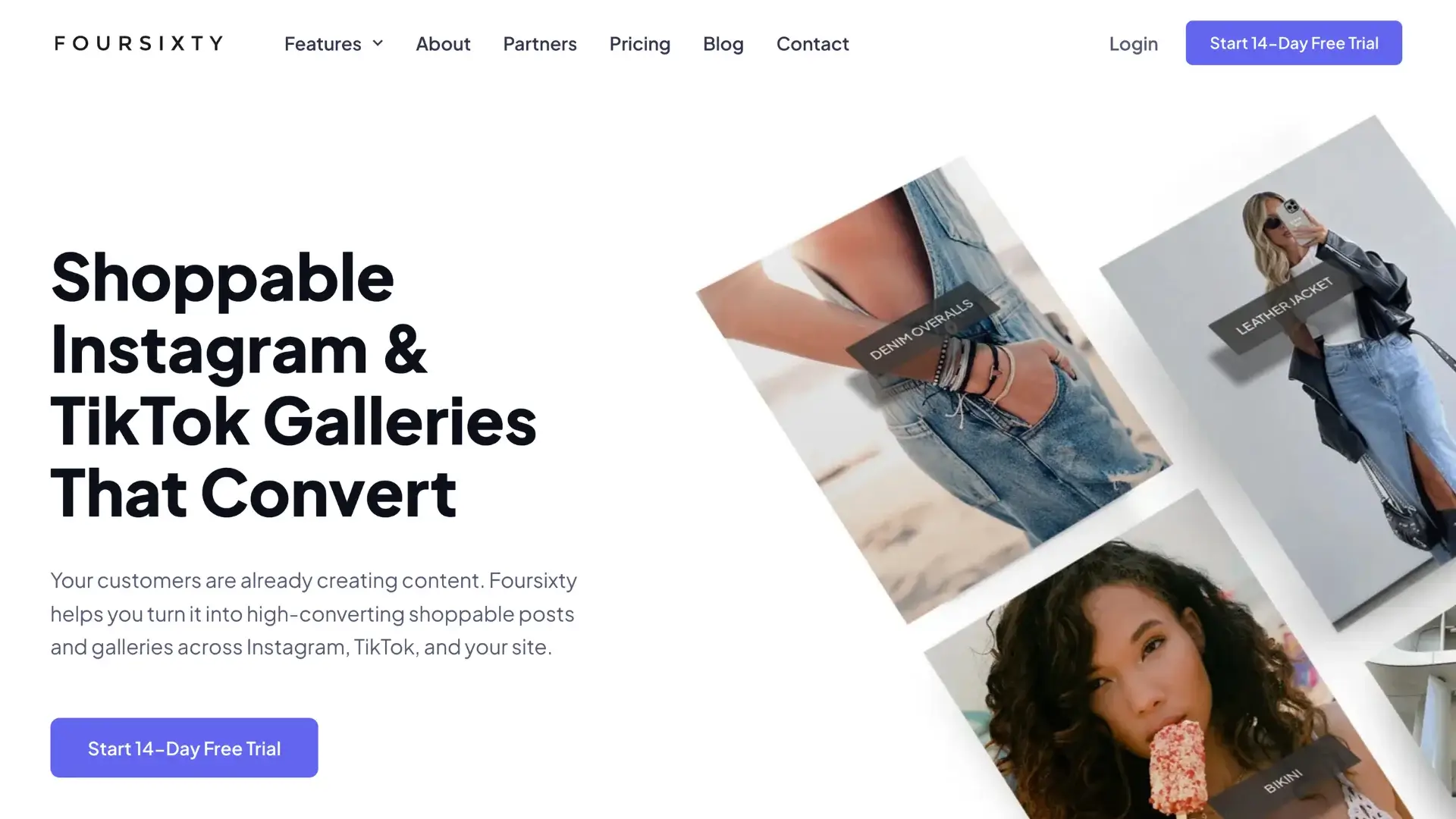
Foursixty UGC platform primarily concentrates on curating and displaying user-generated content to create shoppable galleries and social commerce, specifically from Instagram and TikTok. This could be a good option for businesses heavily reliant on visual UGC for their marketing efforts.
✅ Foursixty is ideal for eCommerce and DTC brands (especially in fashion, beauty, jewellery, and lifestyle) looking to quickly turn Instagram and TikTok content into shoppable, branded experiences with measurable conversion impact.
❌ Foursixty is not suitable for brands in non-visual industries, very small operations, or enterprises requiring extensive API integration.
Foursixty integrates with all major e-commerce platforms, including Shopify, Squarespace, WordPress, Magento, BigCommerce, Demandware, Big Cartel, and Lightspeed, and email integrations with Klaviyo for abandoned cart and email marketing campaigns. They also offer API access for custom integrations.
Fashion & Apparel, Consumer Goods, and Beauty & Cosmetics.
Foursixty has a simple three-tiered pricing structure consisting of Essential ($90 per month), Complete ($300 per month), and Complete Plus ($500 per month). They also offer a 14-Day Trial.
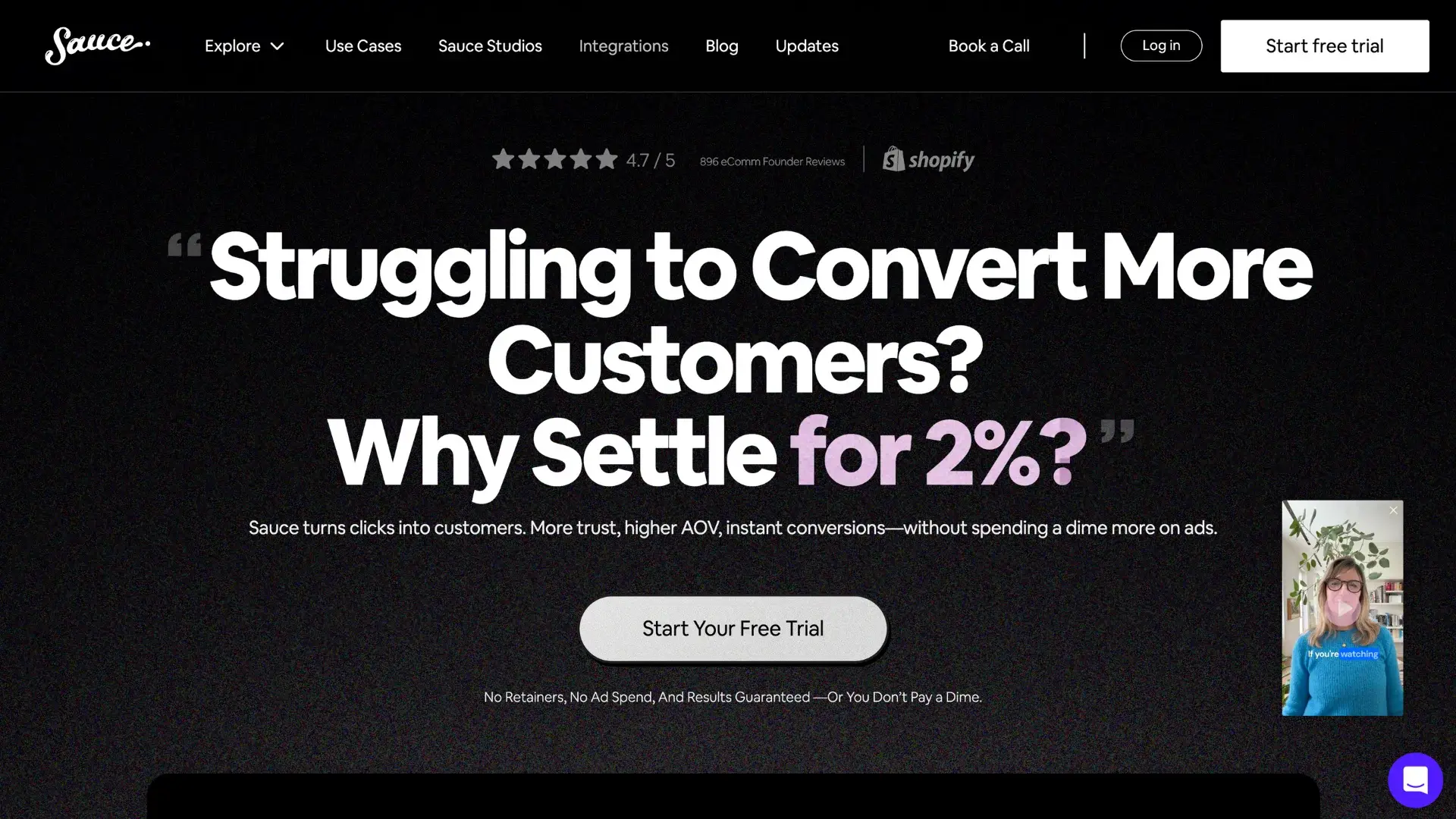
Sauce (previously SNPT) is a UGC platform and visual shopping system that transforms Instagram and TikTok’s UGC and Influencer content into immersive, shoppable experiences across your website and email channels, boosting conversions with visual storytelling and social proof.
Video also seems to be an important visual asset in Sauce’s platform. They have quite a large variety of options when it comes to delivering videos on websites (grids, carousels, loop clips, Sauce TV, and video cards).
✅ Sauce excels for visually-driven, social-first eCommerce brands aiming to boost conversions via shoppable galleries, UGC, and video commerce.
❌ Sauce is not suitable for non-visual industries, brands with low social presence or traffic, or those requiring custom development beyond its standard offering.
Sauce supports Shopify, Adobe Commerce, Big Commerce, WooCommerce, Squarespace, SupaDupa Me, and Klaviyo for email integrations.
Fashion & Jewellery, Beauty & Wellness, Home & Garden, Swimwear, Athleisure, and Hotels & Travel.
Sauce offers four subscription plans. Essentials ($50/month), Standard ($200/month), Prime ($600/month), and Enterprise (starting at $2000/month). All their plans offer a free trial.
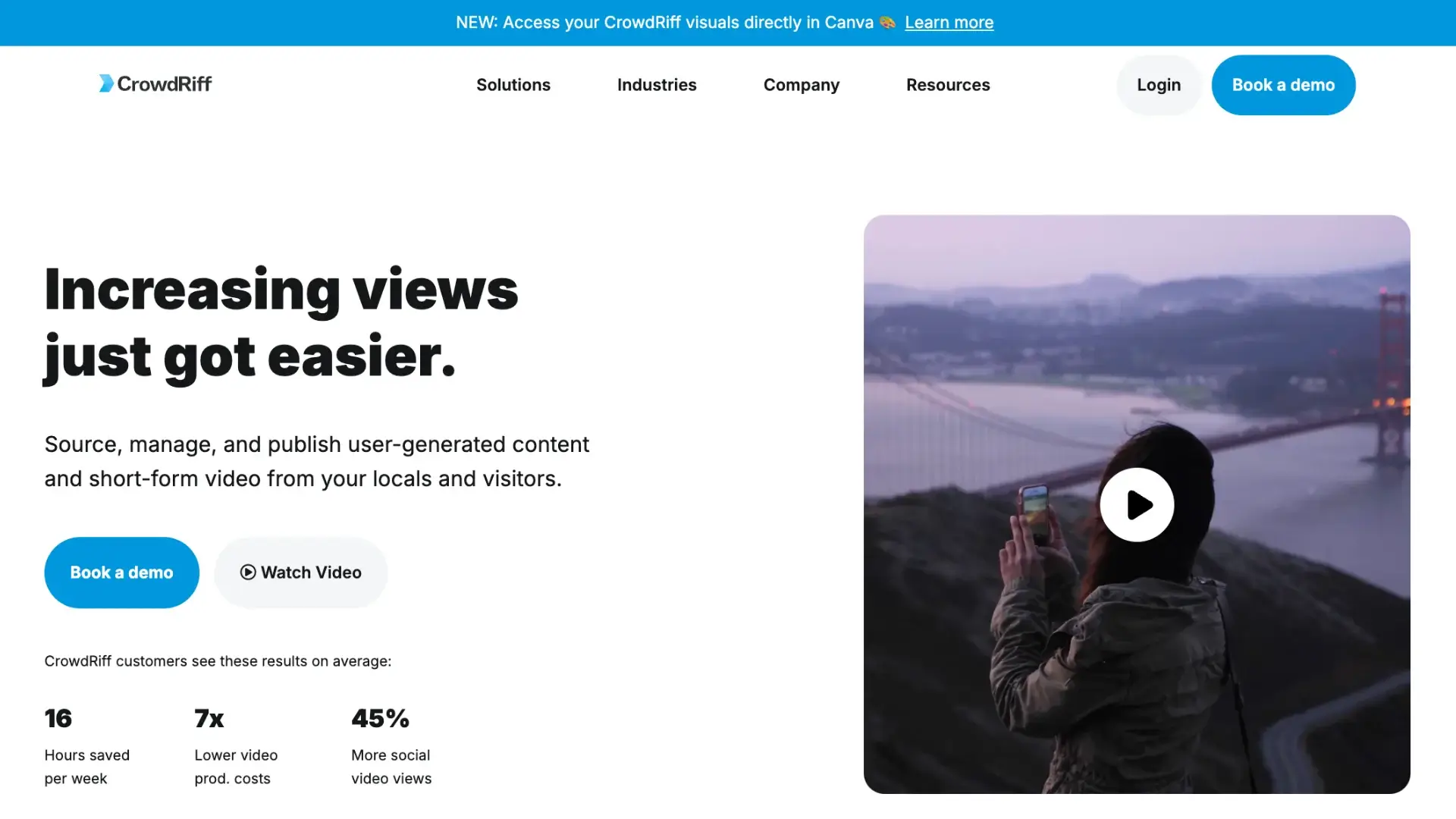
CrowdRiff is a user-generated content platform for leisure, travel and tourism brands. It empowers organisations such as destination marketing organisations (DMOs), hotels, tour operators, and attractions to source, manage, and publish authentic UGC and short-form video in a centralised, AI-enhanced system.
CrowdRiff also provides a space to source, scale and manage content creators based on brand guidelines. For those in the relevant industry, CrowdRiff can be a great fit as their product and service are modelled around the travel and tourism industry.
✅ CrowdRiff is ideal for leisure, travel and tourism brands needing to source, manage, and publish UGC and short-form video from locals and visitors.
❌ CrowdRiff is not suitable for non-travel, small budget, low visual focus, eCommerce/product-centric businesses.
CrowdRiff primarily integrates with content management systems (CMS) rather than traditional eCommerce platforms. It embeds directly into websites and supports integration with CMS — e.g., WordPress, Drupal — and other marketing tools like Buffer and Slack.
Leisure, Travel & Tourism.
CrowdRiff does not have open pricing plans, but those looking to learn more can submit a pricing request form via their website and wait to hear back from their team with more information.
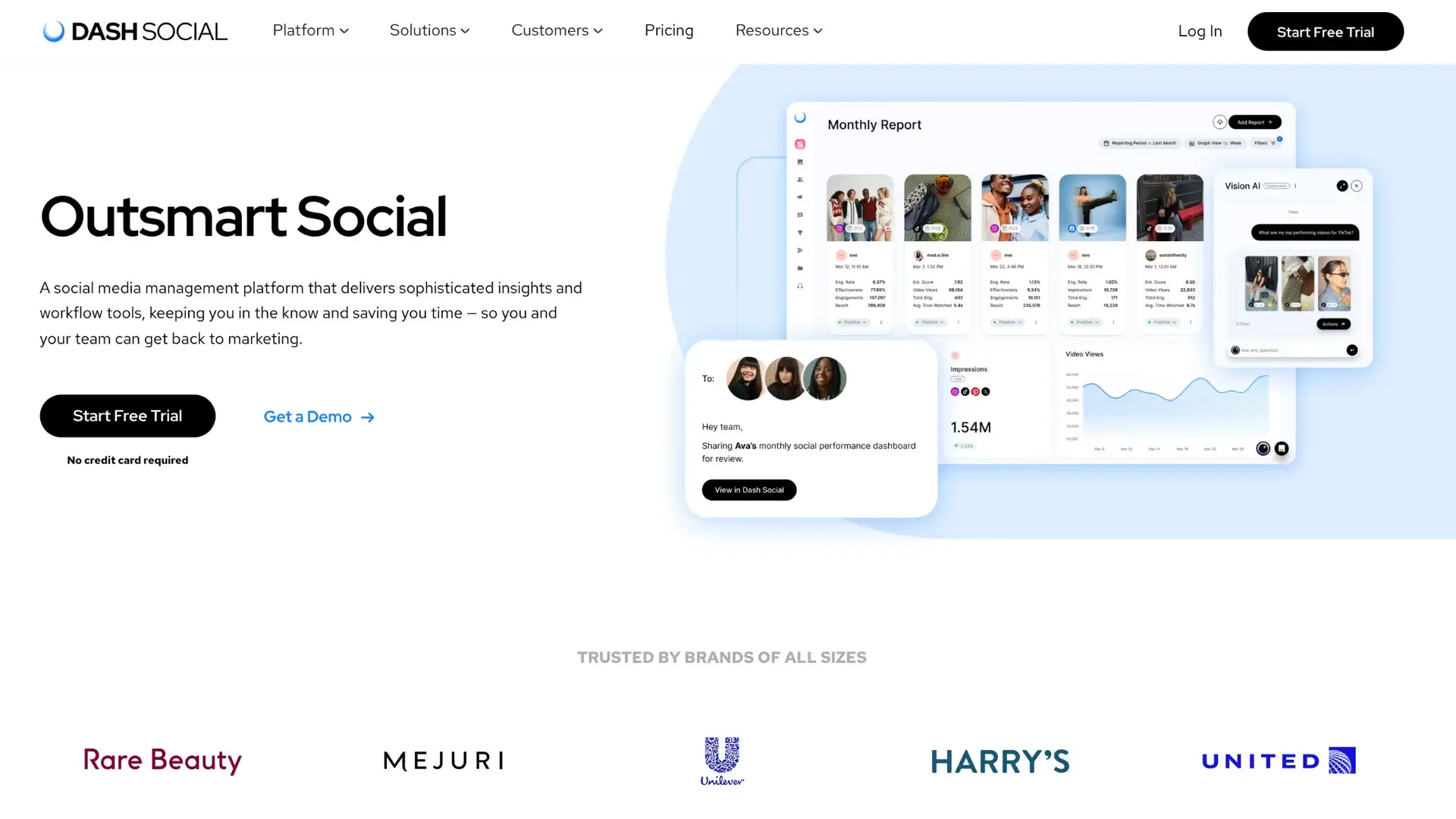
Dash Social is a social media management and UGC platform with an emphasis on visual marketing. The platform is specialised in scheduling and analysing social media content.
They also have a Creators and UGC platform section, focused on the collection and curation of user-generated photos and videos, allowing brands to showcase authentic content created by their customers.
✅ Dash Social is suitable for those who prioritise social media management, influencer and visual content, and social commerce.
❌ Dash Social is not suitable for businesses that don’t heavily rely on social performance or influencer strategies, or brands looking for a powerful eCommerce integration.
Dash Social is not centred on direct eCommerce, except for Shopify. Instead, it’s a robust social media management suite, integrating with social platforms and other business tools like Google Analytics, Klaviyo, Mailchimp, Salesforce, Zendesk, and BigQuery.
Beauty, CPG, Food and Beverage, Fashion and Luxury, Home, Media and Publishing, and Retail.
Dash Social has four core packages: Grow ($499/month), Engage ($899/month), Advanced ($1599/month) and Enterprise ($2999/month), as well as two premium packages: Social Listening ($1,499/month) and Premium Analytics (custom pricing).
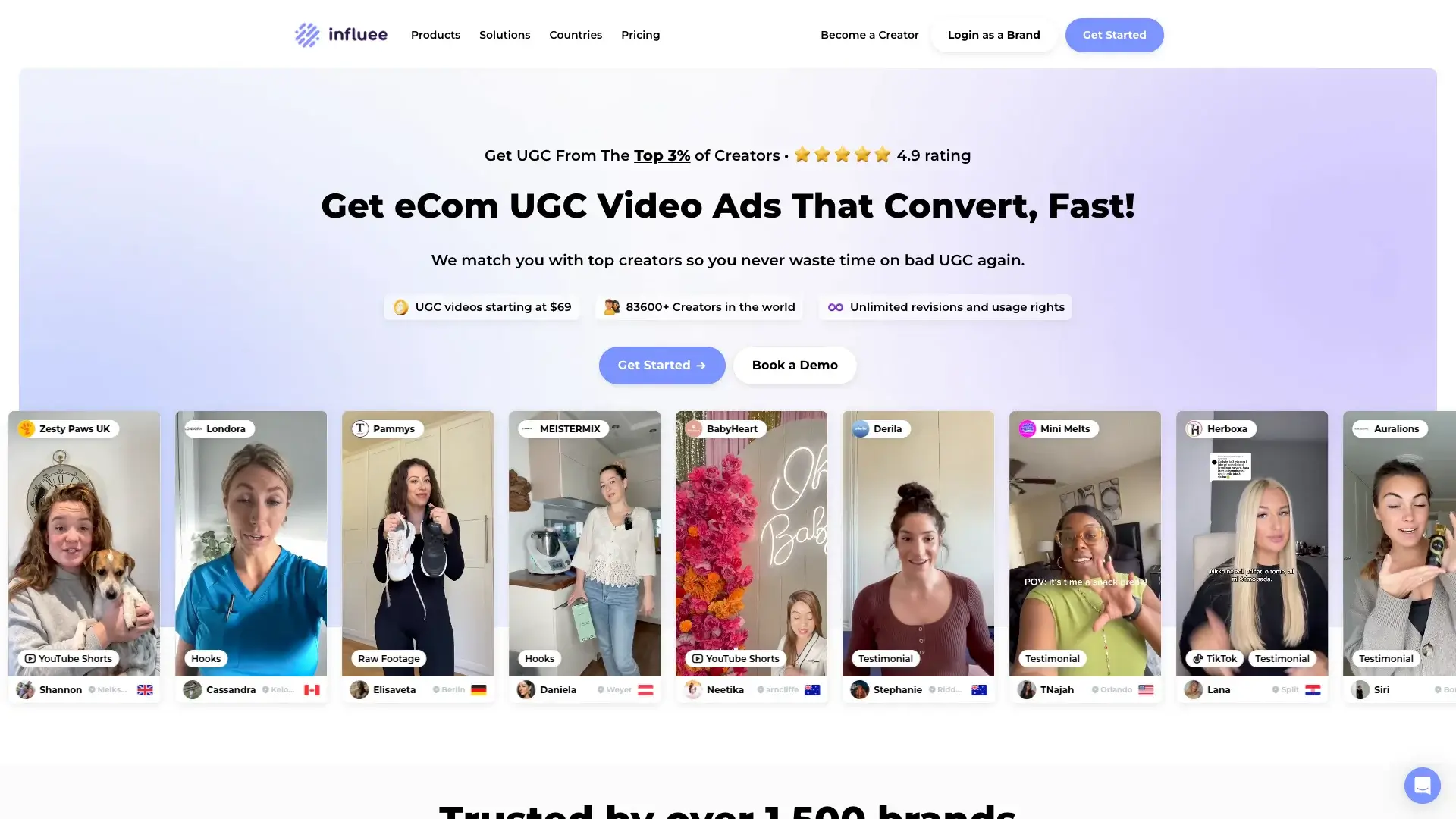
Influee is a UGC creator platform that connects brands with creators. They offer on-demand UGC creation, video editing, and AI videos, with separate pricing packages for each service. Their pool of vetted creators includes more than 50k from 23 countries.
Post a content creation brief, match creators who applied to your campaigns, select the best ones, and receive the content after a few days. Same for AI-generated UGC.
✅ Influee is ideal for leisure, travel and tourism brands needing to source, manage, and publish UGC and short-form video from locals and visitors.
❌ Influee is not suitable for non-travel, small budget, low visual focus, eCommerce/product-centric businesses.
Family, Skincare, Fashion, Healthy, Fitness, Accessories, Food, Consumer Goods, Pets, Home, and Apps & Digital Services.
Influee offers four monthly plans for the on-demand UGC creation service: Starter ($229), Basic ($529), Pro ($999), and Enterprise (custom). They charge separate plans for the UGC video editor and AI videos.
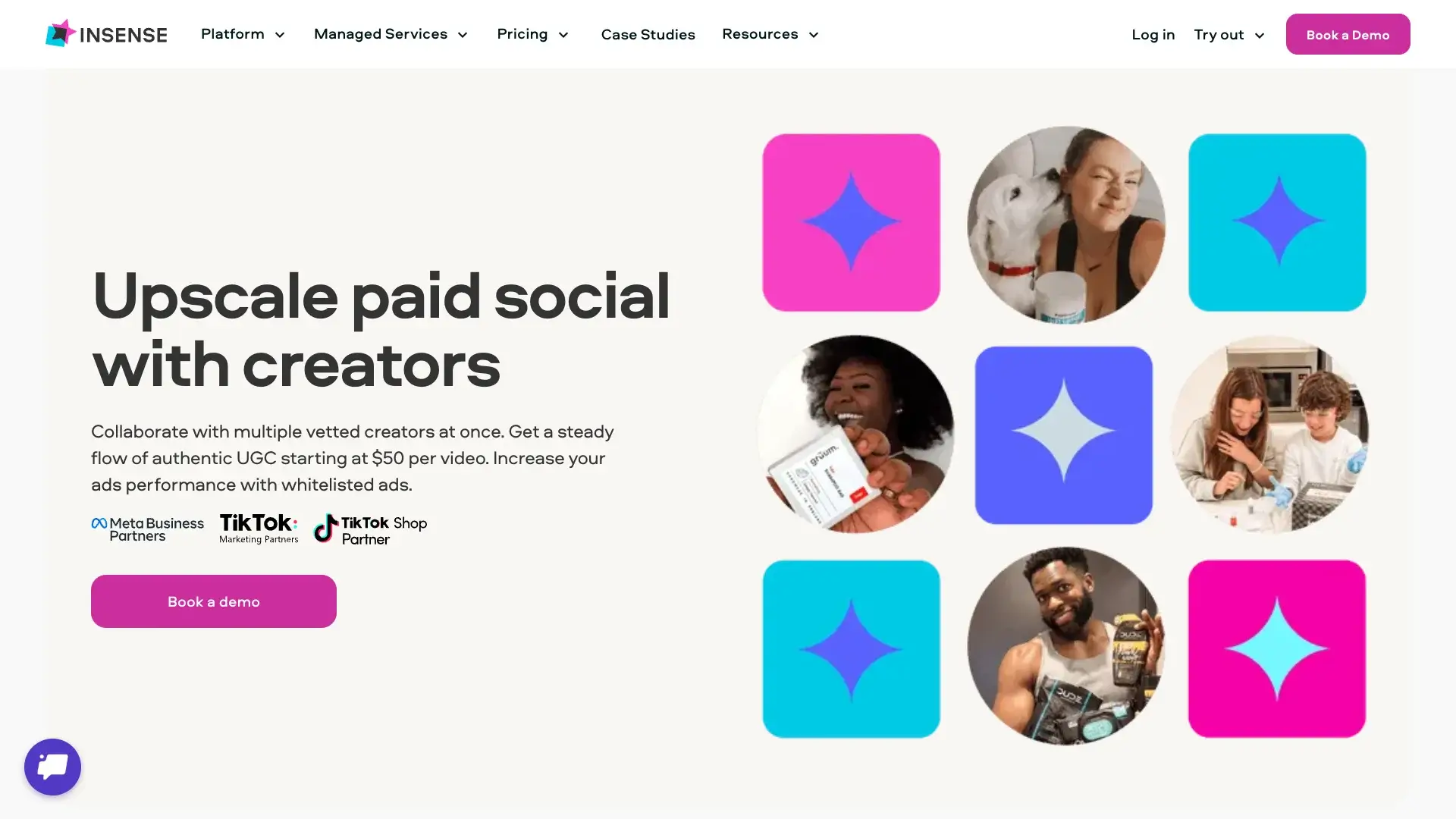
Insense is a UGC platform that streamlines the production of creator ads for business growth. They offer a creator marketplace, creative brief, campaign management, payments and copyrights, relationship management, and performance.
Creators in their marketplace can deliver a diverse range of assets from just UGC content and organic posting to creator ads. They integrate with Meta and TikTok, and offer different pricing options for self-service and managed service packages.
✅ Insense is ideal for brands wanting a more traditional UGC/ influencer marketplace to source content across IG and TikTok.
❌ Insense is not suitable for brands wanting a highly automated performance-based UGC system, or focused on reviews.
Business & Finance, Health & Wellness, Sports + Fitness, Pets, Home & Garden, Fashion & Style, Food & Drinks, Lifestyle, and Beauty & Care.
Insense offers three monthly plans for brands to choose from: Trial ($550/mo), Brand ($500/mo), and Agency ($800/mo). They also offer complementary services, including post-production, creative concepts, and influencer scouting.
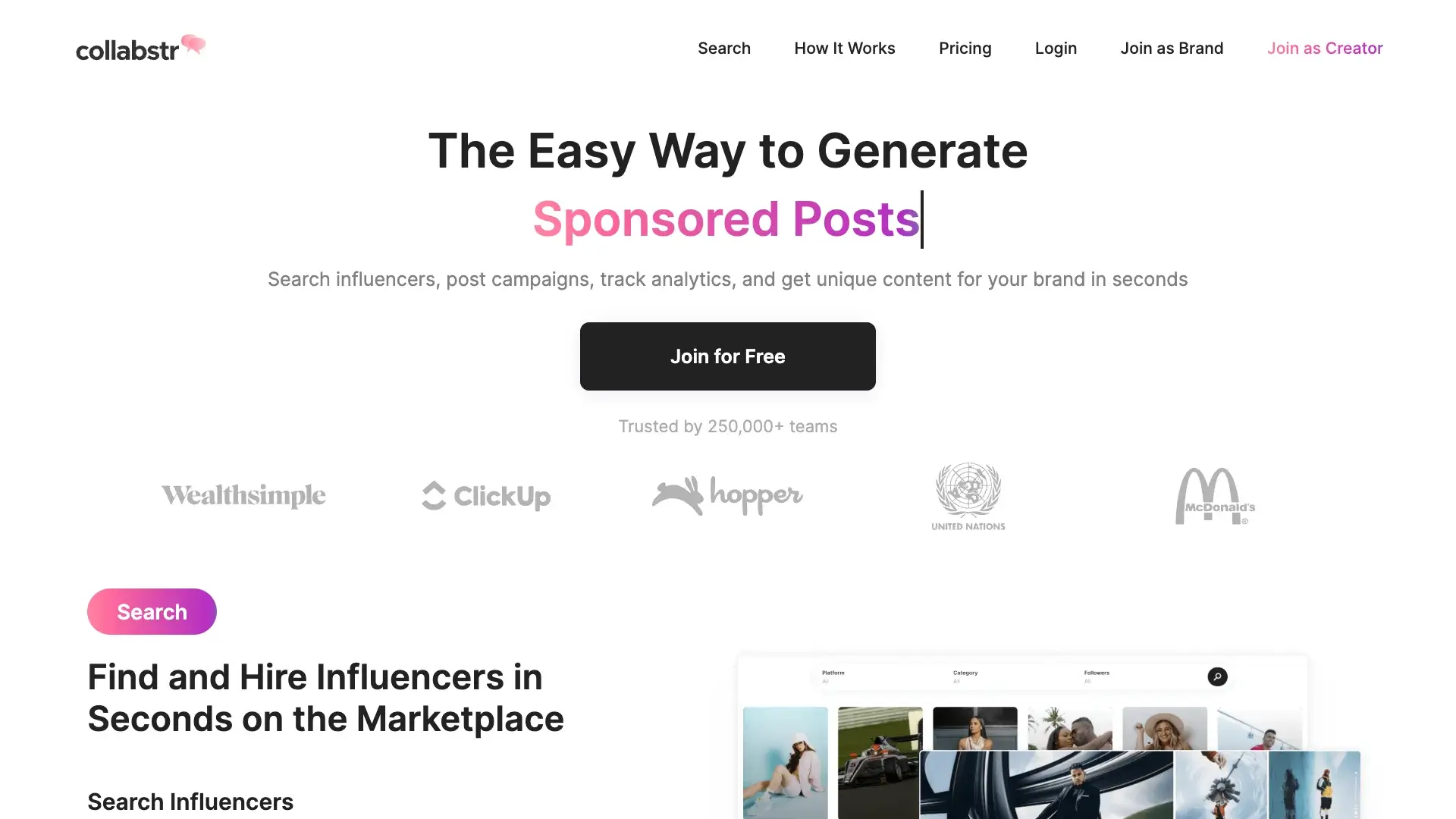
Collabstr UGC platform allows brands to search among thousands of vetted Instagram, TikTok, and YouTube influencers, communicate securely through the platform, and directly receive high-quality content, all while safely paying the creators.
The solution also enables managing campaigns and tracking post analytics and performance in real-time, allowing the brand to purchase sponsored content on Instagram, TikTok, and YouTube.
✅ Collabstr is ideal for brands looking for one-off creator deals or a marketplace with public creator profiles.
❌ Collabstr is not suitable for brands needing managed campaigns at scale or heavy customisation.
Lifestyle, Fashion, Beauty, Travel, Health & Fitness, Family & Children, Music & Dance, Comedy & Entertainment, and many others.
Collabstr offers a free plan that allows you to search influencers on the marketplace. Upgraded plans are Pro ($299/mo) and Premium ($399/mo).
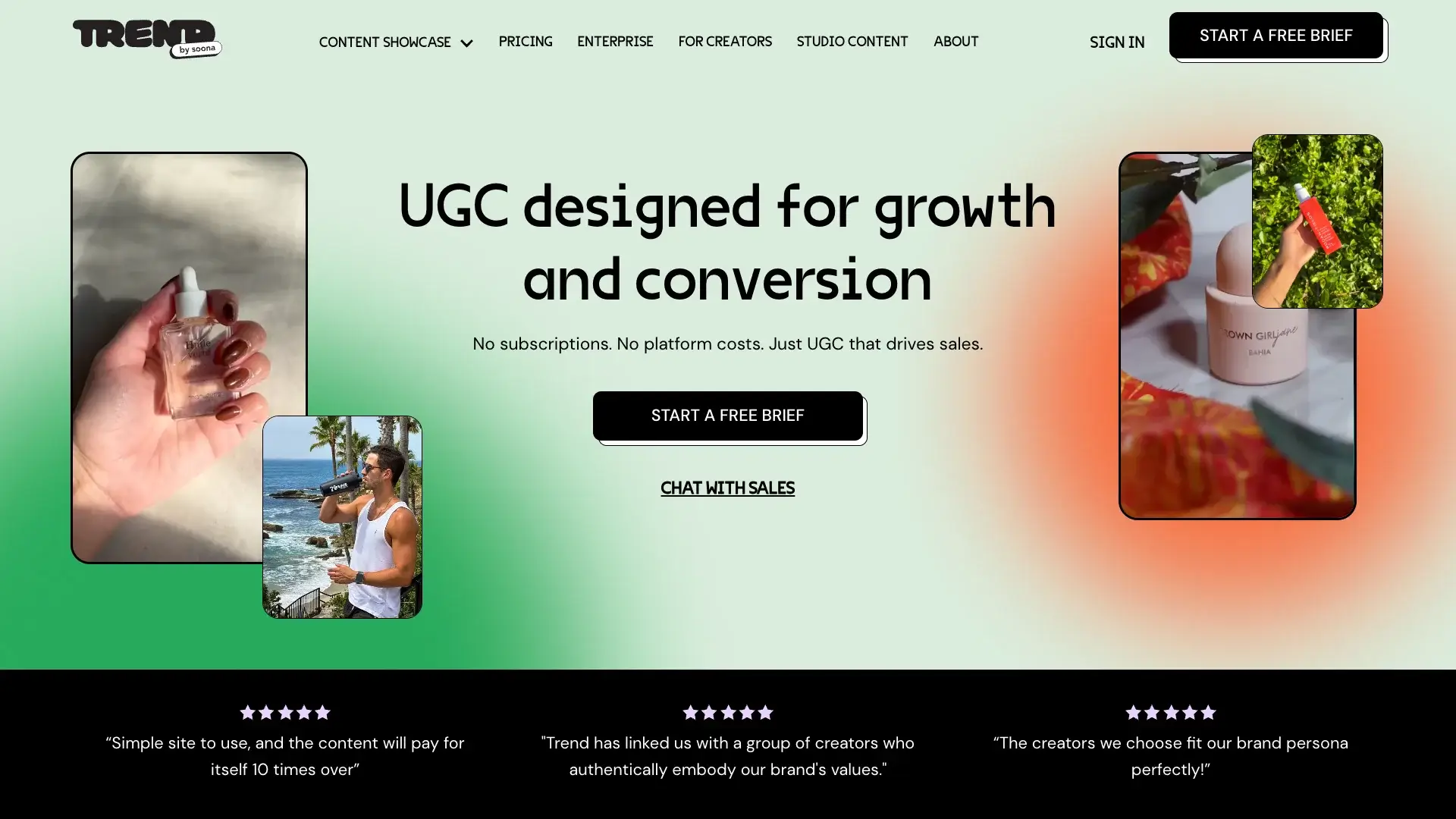
Trend.io is a self-serve UGC content platform that facilitates connections between user-generated content creators and brands seeking collaborative opportunities. Unlike other UGC creator platforms, they offer a fixed-price and credit package system, rather than charging a platform fee.
This system is very useful for small brands with limited budgets or occasional campaigns. Creator credits allow you to book content from creators across the country at a set price. They offer unlimited project requests and full licensing and distribution rights on the content.
✅ Trend.io is ideal for brands that prefer campaign-brief style UGC and flexible pricing models.
❌ Trend.io is not suitable for brands looking for guaranteed content volume or fixed contracts.
No integration is needed to handle projects in Trend.io, as brands receive content directly from creators for repurposing across their channels. However, they mention platforms like Contentful, Google Drive, Dropbox, Shopify and Amazon.
Trend.io may not specify the industries it works with, but they do highlight that its creator should generate content designed to help eCommerce brands succeed.
Trend.io offers four plans, where the number of content pieces and creator credits increases: Starter ($550), Essential ($1,045), Growth ($1,980), and Scale ($3,872). Every package includes the same core functionalities.
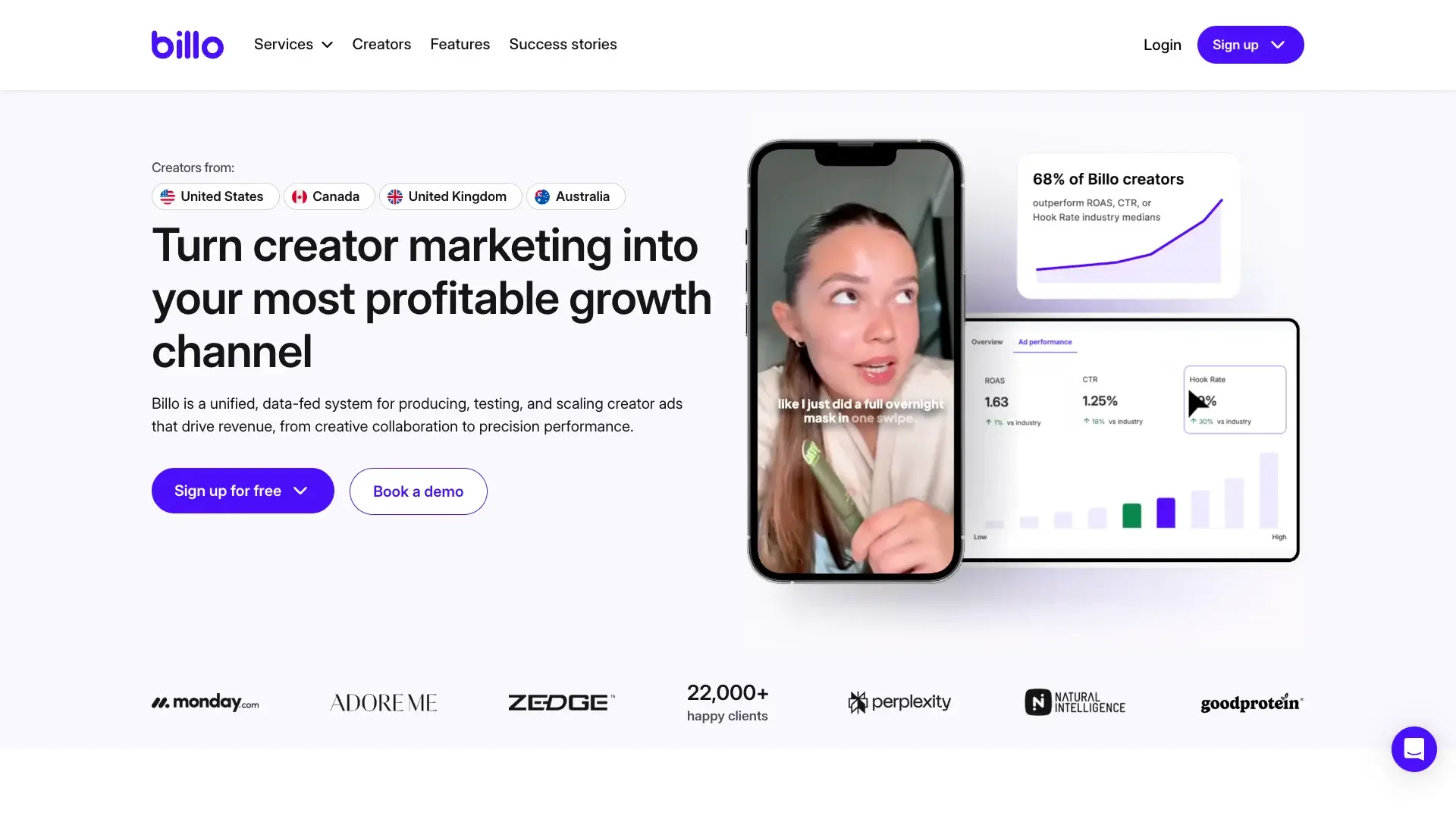
Billo is a UGC platform that allows you to outsource UGC video ads, enabling you to manage video projects with ease. Within their solution, you can select a social media platform, set your video length, add pro editing with one click, and customise every part of your brief to guide your creator.
They have a network of over 5.000 vetted creators, based in the US, Canada, the UK, and Australia, and with a wide range of demographics, styles, and interests.
✅ Billo is ideal for DTC and eCommerce brands needing ad-ready UGC video content, short video ads, and performance-oriented content.
❌ Billo is not suitable for brands wanting many types of UGC (static, reviews, etc.) or custom campaigns beyond video.
Apparel & Fashion, Home & Lifestyle, Health & Wellness, Apps & Digital Services, Food & Beverage, Automotive, and Children & Family.
To get started with Billo, sign up for free and pay when you are ready to place an order.
Here is a summary of the best UGC platforms’ key strengths and ideal clients:
| Platform | Key strengths | ✅ Ideal for | ❌ Not suitable for |
|---|---|---|---|
| Flowbox | All-in-one UGC platform: strong collection, moderation and distribution tools. Rights management, shoppable content, ratings & reviews, seamless widget integration, and influencer marketplace. | European brands seeking an all-in-one solution to manage the content of their UGC creators, influencers, and communities across multiple channels. | Small brands with reduced budgets looking to start building a community or with low website traffic. |
| Bazaarvoice | User-generated content platform: Review-centric ecosystem with sampling and product discovery app to complement their UGC solutions. | Enterprise brands in consumer goods and retail sectors prioritising reviews, sampling and syndication at scale. | Low-volume business brands outside of consumer retail. |
| Emplifi | AI-powered social media management and marketing platform: social UGC, influencer marketing and Ratings & Review. | Agencies, DTC retailers and consumer brands in need of a platform to manage their marketing, commerce and consumer care. | Traditional industries or companies with limited digital strategy needs and low reliance on social, engagement or CX. |
| Social Native | AI-driven creator marketing platform: creator discovery, influencer management and UGC curation. | Brands needing fresh creative content from creators at scale and UGC management tools. | Brands with a low budget for creator collaborations or social presence. |
| Yotpo | eCommerce marketing platform: retention marketing suite with reviews, UGC, loyalty and referrals management. | DTC eCommerce brands driving repeat purchases in need of a platform to turn UGC into retention. | Brands that are highly sensitive to site speed or SEO performance, or looking for an affordable review app. |
| Nosto | AI-powered commerce experience platform: customer, product, and content data unified in real time to improve the eCommerce experience. | eCommerce brands looking to deliver an AI-driven personalised shopping experience. | Non-eCommerce or small brands with limited operations and no need for advanced personalisation. |
| Foursixty | Social commerce and shoppable content platform: Instagram and TikTok UGC into shoppable galleries. | eCommerce and DTC brands looking to turn Instagram and TikTok content into shoppable galleries. | Brands with no visual needs or enterprises requiring extensive API integration. |
| Sauce | Visual commerce platform: Video commerce and influencer content hubs to transform them into shoppable experiences. | Visually-driven, social-first eCommerce brands in need of shoppable galleries and video commerce. | Non-visual industries, low social presence, and brands with custom development needs. |
| CrowdRiff | User-generated content platform: UGC management and high-volume visual asset management for travel marketing. | Leisure, travel and tourism brands looking for a customised solution to collect, manage and publish UGC from locals and visitors. | Brands from other industries, small budget or product-centric businesses. |
| Dash Social | Social media management platform: scheduling and analysing social media content, and influencer management. | Brands that prioritise social media management, influencers, visual content, and social commerce. | Brands looking for strong eCommerce integration, with low reliance on social performance or influencer marketing. |
| Influee | UGC creator platform: connect and manage vetted creators from all over the world to generate UGC videos for your eCommerce brands. | eCommerce and DTC brands wanting to scale video UGC and run local campaigns in multiple markets. | Brands relying on static visual UGC or written reviews. |
| Insense | UGC and Influencer hub: collaborate with creators for UGC, organic content and ads. | Brands wanting a more traditional UGC/ influencer marketplace to source content across IG and TikTok. | Brands wanting a highly automated performance-based UGC system, or focused on reviews. |
| Collabstr | Social media management platform: scheduling and analysing social media content, and influencer management. | Brands looking for one-off creator deals or a marketplace with public creator profiles. | Brands needing managed campaigns at scale or heavy customisation. |
| Trend.io | Social media management platform: scheduling and analysing social media content, and influencer management. | Brands that prefer campaign-brief style UGC and flexible pricing models. | Brands looking for guaranteed content volume or fixed contracts. |
| Billo | Social media management platform: scheduling and analysing social media content, and influencer management. | DTC and eCommerce brands needing ad-ready UGC video content, short video ads, and performance-oriented content. | Brands wanting many types of UGC (static, reviews, etc.) or custom campaigns beyond video. |
Social commerce has become increasingly significant in the eCommerce sector. In 2024, global revenues generated through social media platforms were forecast to reach nearly 700 billion U.S. dollars, an increase of roughly 23% compared to the previous year.
On average, user-generated photos are 5x more likely to convert customers compared to professionally produced content, so the right platform can certainly be a good investment. Discover more about how UGC influences consumer behavior and delivers measurable results in this UGC stats compilation.
These platforms play a crucial role in boosting brand authenticity and trust by utilising the content from social media.
The best UGC platform for your brand will depend on your business or organisation’s specific goals and requirements, based on the features, capabilities, integrations and customer service. Here are some useful things to look for when you’re choosing between different platforms:
UGC platforms are meant to save time for your team. One of the first things to look for in a UGC platform is the tools that would allow you to automatically collect content from different sources (branded and UGC) to repurpose what’s already live.
IA-powered tools to select the best content, tag products from your catalogue, and streamline your moderation tasks are a must. Discover how to automate your UGC management to save time with tools.
Requesting user-generated content permission from creators is one area where UGC platforms differ. Not all platforms have a tool that allows you to request media rights easily. This is a mandatory step to ensure compliance and legal use of organic user-generated content.
Since requesting the rights is one of the more time-consuming tasks in content moderation, ensure that the UGC platform provides an easy way to request media rights from consumers and creators, and that the platform allows you to comply with relevant legal and regulatory requirements.
Unless you are a large international brand with a consolidated community that constantly generates content, make sure your UGC platform also provides a content creator and influencer hub to facilitate tasks like product launch, brand expansion to new markets, and community consolidation.
An influencer and creators pool allows you to discover new content partners, get insights on specific campaigns, and save time by streamlining the legal and financial management process.
It’s recommended to check if the UGC platform you’re looking into seamlessly integrates with your eCommerce platform. Ask the provider if they integrate with your tech stack/website. Consider the platform’s ability to integrate with other software and services you use, such as email marketing tools, accounting software, and social media platforms.
For eCommerce websites that run on Shopify, Magento, Salesforce Commerce Cloud, VTEX, and so on, this will also be a factor; opting for a UGC platform that integrates well with your webshop will be of the utmost importance.
Are there useful data or insights you can analyse from within the platform? Access to comprehensive analytics and reporting tools is crucial for understanding your content performance. Look for an option that offers insights into customer behaviour, sales uplift, and conversion rates.
Do they offer a high level of customer assistance to ensure the success of your UGC campaign? UGC platforms should offer comprehensive customer support to empower businesses in optimising their UGC campaigns. Comprehensive support ensures that users can navigate platform features effectively, unlocking the full potential of their UGC initiatives.
From initial setup to ongoing strategy refinement, dedicated customer support enhances user experience, fosters campaign success, and builds long-term partnerships between businesses and platforms.
Below are frequently asked questions and answers regarding user-generated content and UGC platforms to facilitate your search and selection:
A user-generated content platform is a solution that helps brands collect, manage, and showcase content created by their customers, UGC creators and influencers, such as photos, videos, reviews, and social posts. Brands use UGC platforms to build trust, increase engagement, and drive conversions by showing authentic customer experiences across websites, eCommerce stores, email campaigns, ads, and offline channels.
Depending on the provider, UGC platforms can collect customer photos, videos, star ratings, text reviews, product Q&A, and social media posts tagged with brand hashtags. Some platforms focus on visual content from Instagram or TikTok, while others combine visuals with reviews, ratings, and testimonials.
There are two different types of UGC platforms: for brands to manage UGC and for brands to connect and manage influencers and UGC creators. They also differ in the types of content they support, the industries they serve, and the depth of their features. Some specialise in visual UGC, while others offer review syndication. Key differences include eCommerce integrations, analytics, rights management, ease of use, and support.
Pricing varies by platform and typically follows a SaaS subscription model. Costs may depend on factors like the number of monthly users, content volume, integrations, or advanced features.
Some providers offer tiered pricing for small businesses, while enterprise solutions are custom-quoted.
Most platforms include built-in rights management workflows that let brands request and track creator permissions. This ensures compliance with copyright and data protection laws, which is especially important for global brands. Rights management also protects brands from legal risks when using UGC in advertising or commercial campaigns.
ROI can be measured by tracking conversion rate improvements, increases in average order value (AOV) and average order size (AOS), higher customer engagement, and reduced content production costs. Many UGC platforms provide built-in analytics dashboards to show how UGC influences sales and customer behaviour across channels.
The best choice depends on your goals and business model. Small brands may prefer affordable, easy-to-use platforms, while global enterprises need advanced features like multi-market support, deep integrations, and dedicated account management. Industries like fashion, travel, and beauty brands often prioritise visual UGC, while retailers may value reviews and ratings.
The most effective and time-saving way to gather UGC is via a UGC platform like Flowbox. The benefit of working with a platform is that it automatically collects all of your user content in one centralised hub, making it easy to moderate, request media rights, and distribute UGC across channels.
One of the fantastic things about UGC is its versatility. UGC can be utilised anywhere, including embedded social feeds on websites, in ad campaigns, newsletters, and organic posts on social media accounts.
Activate your community to create an endless stream of UGC. Actively responding to and showcasing UGC on your brand’s official channels encourages ongoing participation and builds a stronger connection between the brand and its community, fostering a positive feedback loop for continuous UGC generation. Implementing creative and interactive campaigns, such as contests or challenges, can motivate consumers to share their experiences with the brand.
Customers’ content is free to collect, although many companies choose to work with UGC creators and influencers to improve the content adequacy and quality. Also, a UGC platform to scale the strategy costs money. The cost of UGC can vary significantly and depends on several factors.
An efficient UGC moderation workflow will most likely consist of a combination of automation and human moderators. This combination ensures that automation saves time and a human touch ensures that brands can safeguard their reputation, uphold consistency, mitigate risks, and filter out irrelevant or low-quality content.